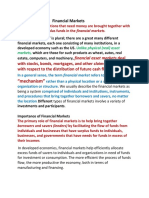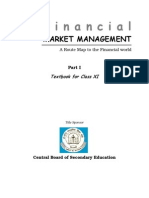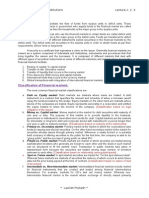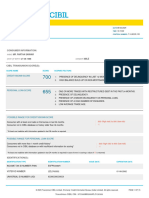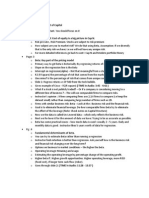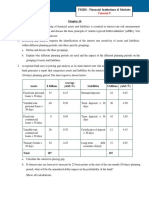Chapter 2 Notes
Financial Markets
• Markets for money, bonds, equities, derivatives, foreign exchange…
• A market in which securities are issued and traded
• Security: Financial asset, such as a stock (equity) or a bond
• Primary Markets: The market where new issues of stocks or bonds are traded
• Initial Public Offerings (IPOs) – the first time a company issues stock
• Seasoned Offerings – issues of stock by a company whose shares already trade
• Money goes to the issuing corporation
• Secondary Markets: The market where existing securities are traded
• Trading between investors – shares and cash are exchanged between investors
• No cash goes to the underlying corporation
• The Toronto Stock Exchange (TSX) is the main stock exchange for trading shares of large
Canadian corporations
• Trading in the shares of smaller emerging Canadian companies is done through the TSX
Venture Exchange (TSX-V) and the Canadian National Stock Exchange (CNSX)
• Other Financial Markets:
• Fixed Income Market: A market where securities promising a fixed amount of
income, such are bonds, are traded among investors. Also known as the Debt
Market.
• Capital Markets: A market for long-term (more than one year) debt and equity
securities
• Money Market: A market where short-term (less than one year) securities are
traded among investors
• Foreign Exchange Markets: Any corporation engaged in international trade must be
able to transfer money from dollars to other currencies or vice versa
• Commodities Markets: Markets where commodities such as corn, wheat, oil, and
natural gas are traded
• Markets for options and other derivatives: Markets where derivative securities
(securities whose payoffs depend on the prices of other securities or commodities),
such as futures and options, are traded among investors
Financial Intermediaries
• An organization that raises money from investors and provides financing for individuals,
corporations, and other organizations
• Some classes of financial intermediaries:
• Mutual Funds and Exchange-Traded Funds (ETFs)
§ Pool investors’ money and invest in a portfolio of securities
§ Provide low cost diversification and professional management
§ Mutual funds are actively managed investment funds
� § Exchange-traded funds are traded on a stock exchange and invest in a portfolio
of securities selected to replicate an established securities index
• Hedge Funds
• A private investment pool, open to wealthy or institutional investors, that is only
lightly regulated and therefore can pursue more speculative policies than mutual
funds
• Private Equity Funds
§ Investment fund focused on investing in equity of privately owned businesses
§ Pension Funds
• Investment plan set up by an employer to provide for employees’ retirement
Financial Institutions
• Banks, insurance companies, or similar financial intermediaries
• Do more than just pool and invest savings
• Raise funding in special ways – by accepting deposits or selling insurance policies
• Provide additional financial services
• Loan money directly to individuals, business, or other organizations
Functions of Financial Markets and Intermediaries
• Transporting cash across time
• Risk transfer and diversification
• Provide liquidity
• Provide a payment mechanism
• Provide information on commodity prices, interest rates, and company and stock values
Value Maximization and the Cost of Capital
• Well-functioning financial markets allow individuals and corporations to share risks and
transport savings across time
• The opportunity cost of capital is the minimum acceptable rate of return on capital
investments.
• Projects offering rates of return higher than the cost of capital add value to the firm
• The cost of capital for corporate investment is set by the rates of return on investment
opportunities in financial markets
























